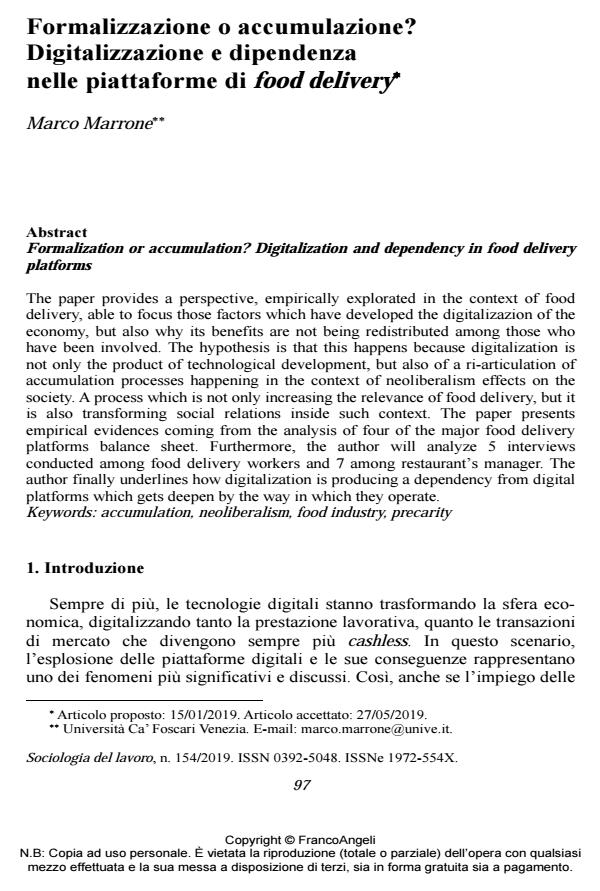Formalizzazione o accumulazione? Digitalizzazione e dipendenza nelle piattaforme di food delivery
Titolo Rivista SOCIOLOGIA DEL LAVORO
Autori/Curatori Marco Marrone
Anno di pubblicazione 2019 Fascicolo 2019/154
Lingua Italiano Numero pagine 23 P. 97-119 Dimensione file 230 KB
DOI 10.3280/SL2019-154006
Il DOI è il codice a barre della proprietà intellettuale: per saperne di più
clicca qui
Qui sotto puoi vedere in anteprima la prima pagina di questo articolo.
Se questo articolo ti interessa, lo puoi acquistare (e scaricare in formato pdf) seguendo le facili indicazioni per acquistare il download credit. Acquista Download Credits per scaricare questo Articolo in formato PDF

FrancoAngeli è membro della Publishers International Linking Association, Inc (PILA)associazione indipendente e non profit per facilitare (attraverso i servizi tecnologici implementati da CrossRef.org) l’accesso degli studiosi ai contenuti digitali nelle pubblicazioni professionali e scientifiche
The paper provides a perspective, empirically explorated in the context of food delivery, able to focus those factors which have developed the digitalizazion of the economy, but also why its benefits are not being redistributed among those who have been involved. The hypothesis is that this happens because digitalization is not only the product of technological development, but also of a ri-articulation of accumulation processes happening in the context of neoliberalism effects on the society. A process which is not only increasing the relevance of food delivery, but it is also transforming social relations inside such context. The paper presents empirical evidences coming from the analysis of four of the major food delivery platforms balance sheet. Furthermore, the author will analyze 5 interviews conducted among food delivery workers and 7 among restaurant’s manager. The author finally underlines how digitalization is producing a dependency from digital platforms which gets deepen by the way in which they operate.
Parole chiave:Accumulazione, neoliberismo, industria del cibo, precarietà
- Digital Labour Platforms in the Italian Domestic Sector: Approaching (In)Formalisation Processes from the Other Way Round Iraklis Dimitriadis, Diego Coletto, in Critical Sociology 08969205241295949/2024
DOI: 10.1177/08969205241295949 - La classe operaia va nel cyberspazio. Il capitalismo di piattaforma oltre i miti della digitalizzazione Marco Marrone, Gianmarco Peterlongo, Giorgio Pirina, in ECONOMIA E SOCIETÀ REGIONALE 1/2021 pp.127
DOI: 10.3280/ES2021-001011 - Beyond the ‘salary institution’: on the ‘society of performance’ and the platformisation of the employment relationship Federico Chicchi, in Work Organisation, Labour & Globalisation /2020
DOI: 10.13169/workorgalaboglob.14.1.0015 - Capitalism in the Platform Age Federico Chicchi, Marco Marrone, pp.115 (ISBN:978-3-031-49146-7)
Marco Marrone, Formalizzazione o accumulazione? Digitalizzazione e dipendenza nelle piattaforme di food delivery in "SOCIOLOGIA DEL LAVORO " 154/2019, pp 97-119, DOI: 10.3280/SL2019-154006